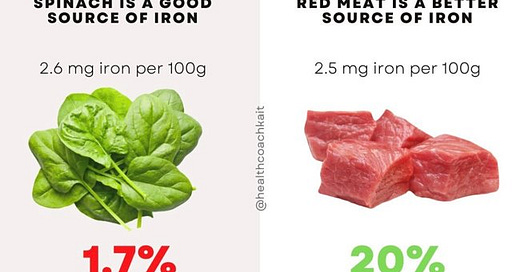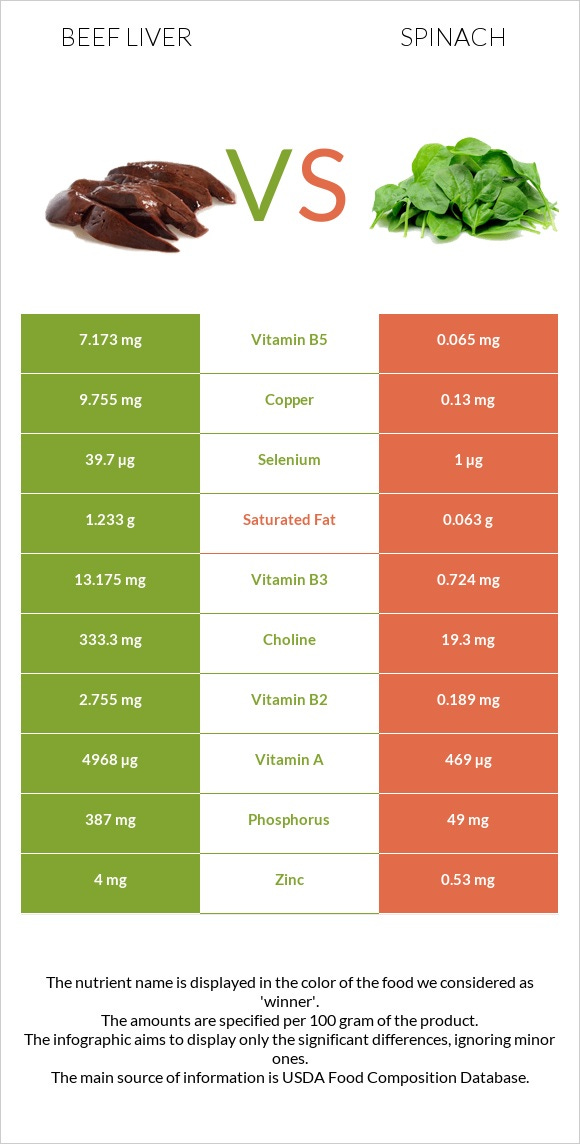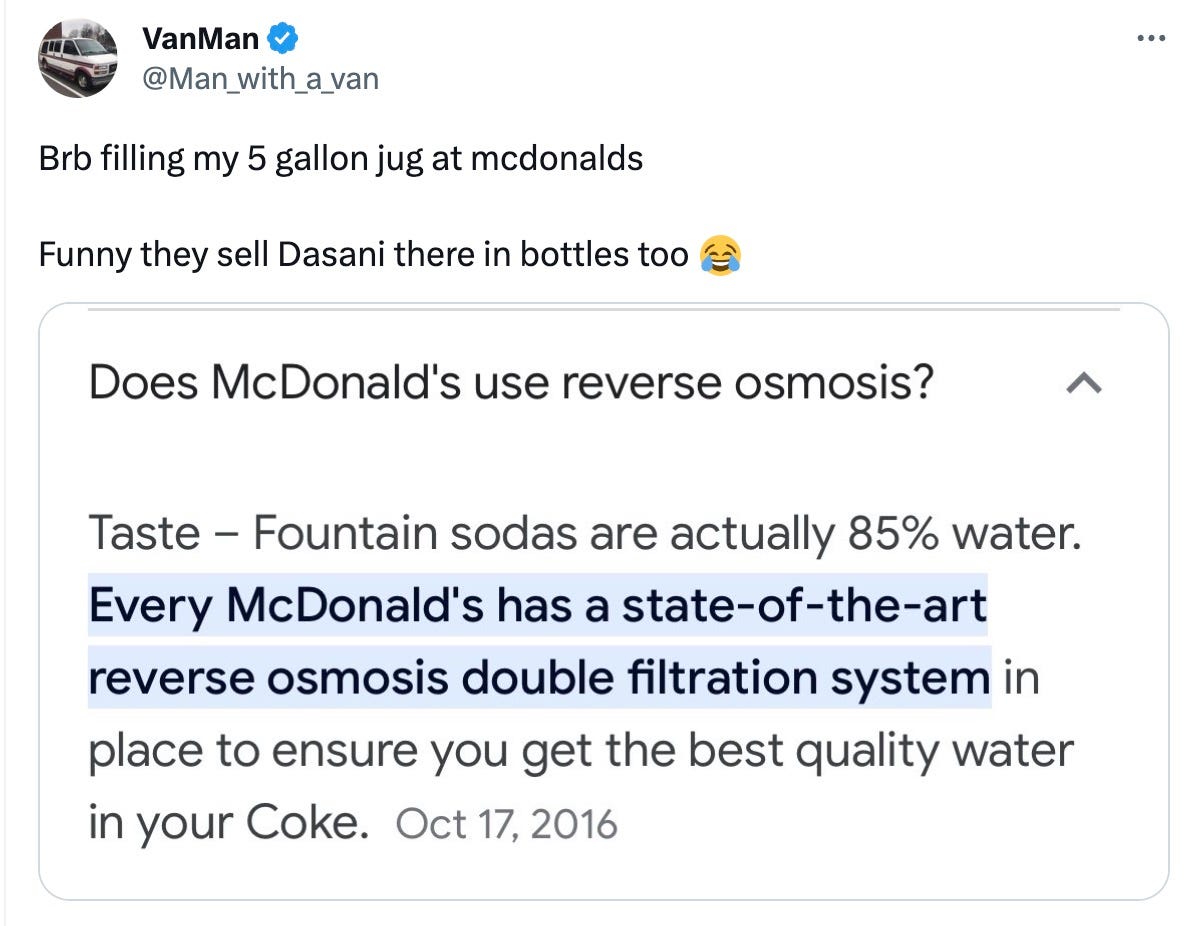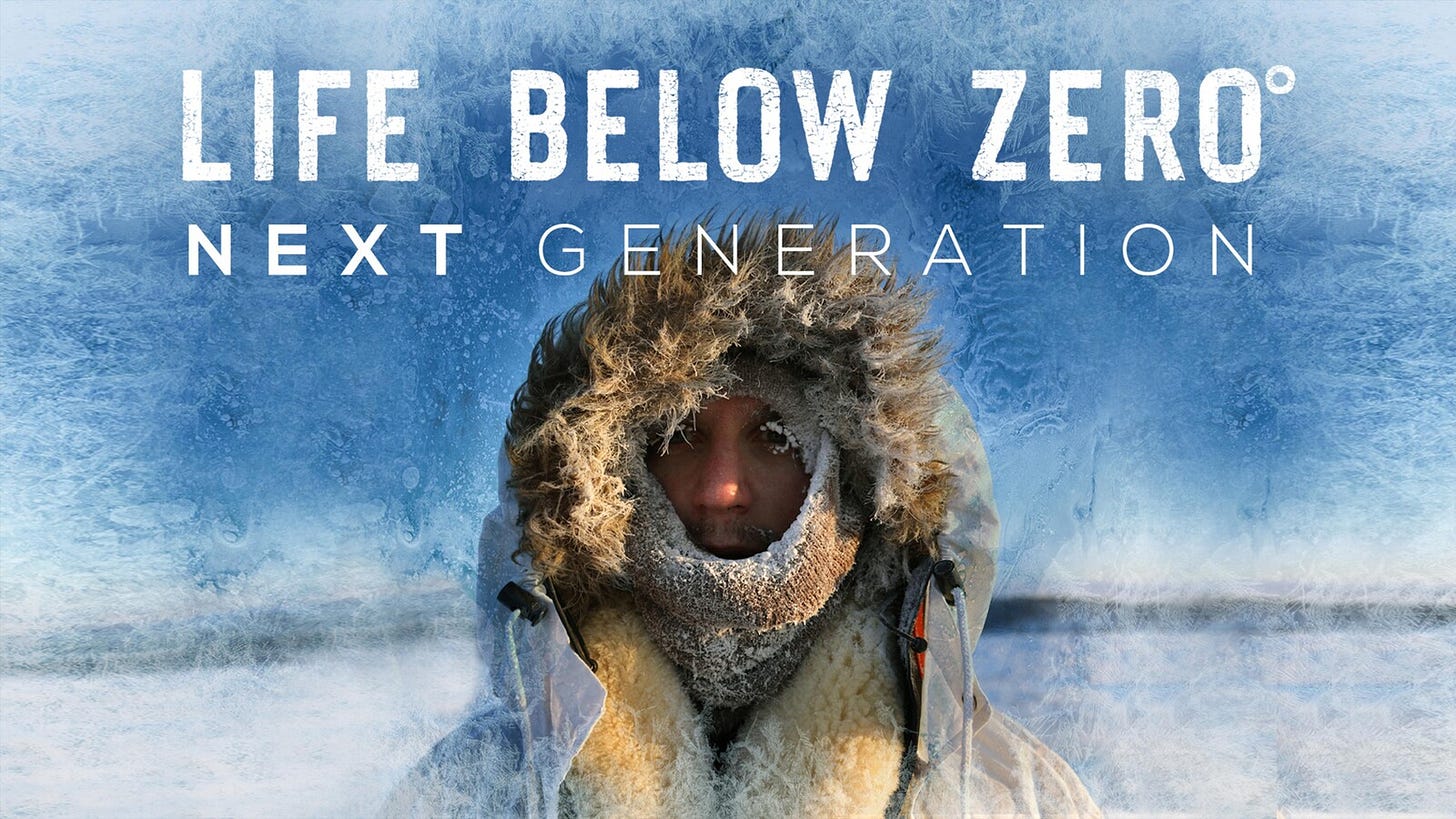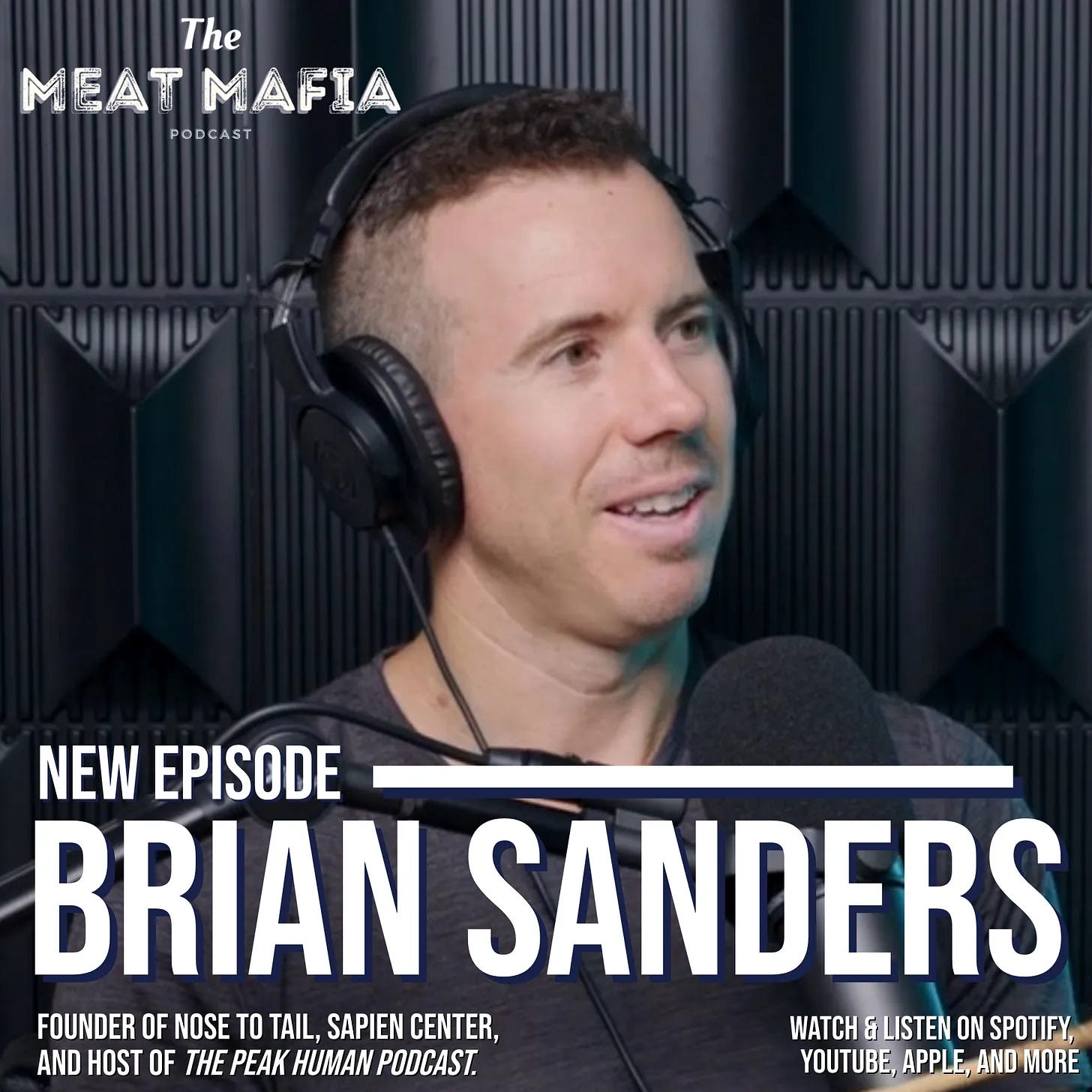Our mission is to promote the benefits of a meat-based diet as a counter to the anti-meat rhetoric that’s pushing modern humans in the wrong direction. We gain ground by introducing more people to this results-driven way of life.
🥩 Hello Meatlings,
One common misunderstanding is that plants (I’m looking at you, vegetables, nuts/seeds, beans + grains) offer abundant much-needed nutrients for our bodies to thrive. And yes, while they offer vitamins, minerals, and fiber, meat can be just as and, in many cases, more nutrient-dense.
The first example is just plain comparing vitamin and mineral levels. Steak has higher levels of individual micronutrients compared to “higher protein” beans: Source
But that doesn’t even compare when we look examine nature’s multivitamin, liver to plant protein superfood spinach - Source:
Also, we cannot forget that plants have anti-nutrients (phytates, lectins, oxalates, and fiber) that inhibit the absorption of these micronutrients. Check out this study that examined how eating oysters, black beans, and corn tortillas impacted zinc blood levels. Eating beans or corn tortillas decreased the bioavailability of zinc from oysters, and inhibition was significantly more significant by tortillas than by beans.
The last difference in quality is the bioavailability of the micronutrients in plants vs. animals. Animal products have the most bioavailable, aka “ready to use” forms. For instance, meat has heme iron, and plants have non-heme iron: Source
So if you like eating plants, here’s what you can do: use ancient food preparation techniques or seek products made by soaking, sprouting, and fermenting.
These processes can degrade the anti-nutrients, making plant food more nutritiousthough meat is still best.
✌🏻and ribeyes,
-Miranda MS, LN & The Yes2Meat Team
Below:
📰 News + 🔬 Research: Feeding windows and diabetes
⚖️ Useful $hit: 2 things you didn’t realize you needed to know. And now you do.
🤣 Memes: What farmers know about ag vs what vegans know
🔗 Link Corner: Always useful
🏛️ Legislative Updates: Hear what Nutrition Coalition is up to in DC and what you can do to support real food legislation
💯 New CEO Corner: Inflation 💸
📰 News & 🔬 Research
⏰ Condensed eating time = reduced risk of diabetes: According to a recent study published in Nutrients, an in-depth examination of previous research on intermittent fasting revealed a clear link between the frequency of daily meals and the incidence of type 2 diabetes and metabolic issues.
The researchers observed that fasting for a minimum of 12 to 14 hours overnight resulted in reduced glucose and insulin levels, as well as a decrease of 550 calories per day. Moreover, they discovered that time-restricted eating positively impacts the gut microbiome, leading to a reduction in the inflammatory cascade associated with metabolic syndrome.
😷 Aspartame possible carcinogen: A few weeks ago it was announced that sucralose (Splenda) is “genotoxic,” meaning it breaks up DNA. It’s no surprise that aspartame probably is just as terrible. The latest is that aspartame is being reviewed again by global health bodies assessing its potential links to cancer. A separate WHO and United Nations committee, the Joint Expert Committee on Food Additives, is now updating its risk assessment and will be announced on on July 14.
👞 Eating Shoes > Lab Meat: Finally, a regenerative agriculture advocate is receiving some attention in the New York Post. Diana argues the best type of meat comes from farms where animals are allowed to graze and raised outside of the industrial food system, where animals are brought up in over-cramped conditions and pumped full of hormones. She is a critic of alternative meat sources, such as plant-based meat. Cell-cultivated meat is expensive.
A pound of cell-cultured meat would cost about $17 to make, compared to $2 for regular meat, according to Bon Appetit. GOOD Meat’s product is made of chicken cells, salt and a combined base product of wheat and soy, and there is no nutritional label available for it at this time, as its product will only be available at restaurants for now.
🦬 July is Bison Month: The National Bison Association announced the kickoff to July Bison Month today, encouraging consumers to add this uniquely American, delicious, humanely raised, supremely healthy protein to their regular diets. The American Bison, whose population once exceeded 30 million animals, was decimated to near extinction in the late 19th century through a combination of hunting, slaughter, and western-introduced disease. However, the bison has made a tremendous comeback and now numbers over 400,000 head across the continent. This is thanks to a unique collaboration among American farmers and ranchers, Native American tribes, and conservation groups all working to restore the species back to its historic range across North America.
🪓 Useful $hit Corner
😎 Swap to a tallow-based sunscreen: mineral-based sunscreens are often full of sunflower or safflower oil. Your skin eats what you put on it which means seed oil topicals are a problem.
Miranda has been using Dakota Tallow (not affiliated) this summer, which is lightly tinted with organic cocoa powder to help reduce the white hue of the zinc oxide, but feel free to find any brand that you want to support!
🥩 Why Go for Bone-In? Grilling over an open flame gives beef wonderful char and smoky flavor, but it can dry out your steaks if you’re not careful.
Because bones heat up slower, the meat next to them stays juicy while the rest of the steak cooks. Look for bone-in porterhouse, T-bones and rib-eyes!
🤪 Memes
New Recipe: Meat-Based Carrots
🔗 Link Corner
Whole Milk is illegal in public schools: A bill advancing in Congress aims to change that, but Democrats are opposed. Why?
The Nutrition with Judy podcast is for people wanting root-cause healing with a meat-based Carnivore diet. She puts out rigorously researched information on a regular basis!
Twitterings 3x
🎥 Life Below Zero: The next generation
A humbling series on what it takes to survive the wild Alaskan frontier. Armed with only a few modern conveniences, these survivalists must prepare for the hash Alaskan winter and their survival relies on hunting big game. See firsthand the humbling dynamic between hunter and Mother Nature.
🏛️ Legislative Updates
From the Nutrition Coalition, Putting Whole Milk Back in Schools
The Nutrition Coalition has spent most of June working to bring whole milk back to public schools, where it’s been banned since 2010. Our best chance at doing this is via the Whole Milk for Healthy Kids Act that was introduced earlier this year by Chairman of the House Agriculture Committee, Glenn “GT” Thompson (R-PA), and Kim Schrier (D-WA). On June 6th, the bill passed a major hurdle and it currently awaits a vote from the full House.
In order to support this legislation we first submitted a letter of support to Chairman Thompson highlighting the fact that whole milk is a natural food that humans have been consuming for thousands of years, long before the epidemics of obesity and heart disease. This letter was entered into the official Congressional Record, and Chairman Thompson mentioned the Nutrition Coalition coalition by name during the committee hearing (1:54:29).
Here’s a great excerpt from the Chairman’s remarks:
“This policy has cheated our children and has led to economic demise in Rural America as we’ve seen a loss of dairy farms and small businesses that are in that supply chain. It’s time to reverse the mistake that was made in 2010. We need to follow real science, not political science. I question the process of the Dietary Guidelines Advisory Committee. These are unelected bureaucrats, and there’s no oversight. This is our chance to actually do something positive in that process to say ’hey we’re watching what you’re doing. We’re looking over your shoulder…’”
A few weeks ago, our executive director, John Bates, joined the Chairman for a policy panel on Capitol Hill to educate staffers on the benefits of whole milk and the misguided policies that led to it being banned in the first place.
Here’s an excerpt from an article about the event in Ag Moos: For the Nutrition Coalition, John Bates explained they are a non-profit, non-partisan organization that seeks to improve health in America by ensuring that the public gets evidence-based nutritional advice. They emphasize good science, transparency, and methodology and receive no industry funding.
“When the Healthy, Hunger-Free Kids Act was enacted in 2010, milk became counted as part of that less than 10% of calories from saturated fat, when previously it had been in its own, separate beverage category,” said Bates. He noted that the U.S. Dietary Guidelines that these rules for schools are based on “never reviewed studies on dietary fat specifically for children until 2020. Children have just been assumed to be like adults, but children are different: they need more protein for their growing bodies and more fat for their growing brains,” said Bates.
What’s Next?
A companion bill has been introduced in the Senate by Senator Roger Marshall, a physician from the states of Kansas. While we wait for a full vote in the House, the most important thing we can do is help add cosponsors in the Senate.
You can find out who your Senators are and how to contact them here. When you call, tell them you’d like them to cosponsor S.1957 to allow schools to offer whole milk through the National School Lunch Program.
🎙️ Brian Sanders: The Third Place, Hunting with the Hadza, & Community for Our Health
The point about community might be one of our greatest struggles as modern humans living in an industrialized, isolated, and rich society. What do you think? Let us know in the comments below!
🤝 CEO Corner
Colin on advice, feedback, and musings.
Go outside as much as possible. Then some more.
Our ancestors didn’t live in homes. Their home was Nature. Literally.
They slept on the ground, in trees, and sometimes in caves.
This meant they had plenty of contact with nature, both physically and emotionally. You might say spiritually as well.
Compare this to modern humans today, where those living in industrialized societies spend MOST of their time inside. In some estimates, it’s indoors as much as 99% of the time.
That’s unbelievable. And not very Wild.
Then factor in how most modern buildings are toxic and made from manmade ingredients, and it should be no surprise that most modern humans are sick and getting sicker daily.
Sleep when the sun is down and rise when it’s up.
Since our ancestors didn’t have electricity, there was no controlling light beyond the fire. You get darkness when the fire goes out, and the sun goes down. And you don’t have any say in the matter. So sleeping at night became mandatory rather than wandering in the dangerous Wild while night-vision predators stalked around.
We are designed to sleep at night and rise in the morning. It’s built into our biology. We have a circadian rhythm that tracks this sun-up and sun-down cycle.
If you manipulate light and sleep in your environment, your biology will feel off. You’ll confuse it. And you’ll likely pay a healthy price for it.
💻 Inflation and The US Stock Market
Inflation has been around 7% historically (which is manipulated, so it’s possible it’s even higher). It's also increasing as the debt and house of cards in the global financial market, with trillions in derivatives and other paper assets," get more expensive to prop up.
As Americans, we don’t feel it as much in America because we export our inflation to the rest of the world. (Though the lower economic classes def feel it.)
The poor farmer in Africa gets his hands on American dollars. Then, each time the FED prints money, his dollars are worth less. And we get to benefit from some of that theft while the richest benefit the most. Think of it as inflation insulation.
Those at the top that own mostly assets benefit while while the lower and middle-class non-asset owners are hurt the most, which includes Americans and the rest of humanity since the dollar is the world reserve currency.
It’s trickle down inflation. See also The Cantillon Effect.
🚨 Biohack
☀️ Great thread on the freest and maybe one of the most important things you can do each day: grounding
🥩 The Yes2Meat Newsletter and Community
The Yes2Meat community is a hub to bring like-minded people together to share, collaborate, commerce, and help grow the world’s most important movement for change
Become a subscriber below to support us (with a ton of limited access coming soon to supporters) 👇🏻
🙏🏻 Our Supporters
*Using our affiliate links supports the project and helps us reach more people
Noble Origins → Nose-to-Tail nutrition in tasty chocolate and vanilla featuring organs and beef protein. FREE BAG OF ORGANS ($40 value) with every $50+ purchase: CODE: YES2FREEORGANS
Wild Foods → Sourcing the highest-quality foods and supplements from around the world. Use code Yes2Meat for 15% off your entire order of Real Food sourced ingredients and supplements.
Nose to Tail → We deliver locally produced regenerative meat & beef tallow body care to your door.
Thrive Nutrition → Personalized nutrition counseling using real food to reverse disease or augment already good health. Burn fat, fix your gut, heal emotional eating, and more.
The Better Human Newsletter by Colin Stuckert → Weekly, Free, and full of useful ways to be a Better Human.
The Meat Mafia Podcast → Harry Gray and Brett Ender are the hosts of the Meat Mafia Podcast, which aims to address fundamental issues with our food and healthcare systems.
👋 The Yes2Meat Team
Brian Sanders, Founder
Colin Stuckert, Founder
Miranda MS, LN - Chief Nutritionist & Editor
Volunteers → let us know if you want to help support


